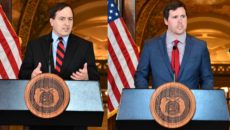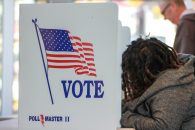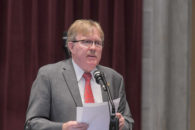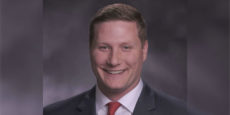Signed into law earlier this year, a new education scholarship program in Missouri is now at the forefront of an initiative petition battle — with school choice advocates concerned about the future of local school boards’ authority.
An initiative petition filed in August seeks to prevent the state from authorizing or implementing vouchers or tax credits for tuition at non-public elementary or secondary education schools. The initiative petition would bar the implementation of programs previously passed by the legislature.
It also would require the state school board to “implement and supervise a uniform method of evaluation and accreditation” that would apply to all public schools.
Earlier this year, the legislature passed Rep. Phil Chrisofanelli’s education savings account bill. Education assistance organizations are required to distribute grants in a prioritized order for students with an approved individualized education plan (IEP) or who live in a household eligible for free or reduced-price lunch.
The program is capped at $25 million in tax credits, was signed into law, and went into effect in August.
Treasurer Scott Fitzpatrick announced Monday he had hired Kim Baughman, previously with the Department of Economic Development, to oversee the new MOScholars program.
The initiative petition was filed by Sherri Talbott, who previously served on the Missouri National Education Association (MNEA) board, on behalf of Taxpayers for Accountability. An August statement of committee organization filed with the Missouri Ethics Commission lists Talbott as the Taxpayers for Accountability’s treasurer.
Hundreds of public comments on the initiative petition, provided to The Missouri Times, were critical of the changes it proposed and argued it could hinder both public and charter schools. The comments came from education advocacy groups as well as Missouri parents.
One Liberty resident said the ESA program would enable her grandchild to receive tutoring that is “desperately” needed.
“The uniform requirement of this initiative petition would significantly limit the ability of the State Board of Education (SBOE) to incorporate community input on the design and accountability standards for all public schools across the state,” said Robbyn Wahby, executive director of the Missouri Charter Public School Commission. “It would also limit local control of schools overseen by locally elected school boards or the nonprofit governing bodies of charter public schools sponsored by legislative-created bodies like the Commission.”
Talbott filed a lawsuit in mid-October challenging the Secretary of State’s Office ballot language for her initiative petition. That language says:
Do you want to amend the Missouri Constitution to:
-
- remove opportunities for disabled, special needs, and those students who are economically disadvantaged by eliminating public funding to non-public elementary and secondary schools through vouchers, tax credits, tuition subsidies and other funding for student attendance and staff employment;
-
- limit the influence, power and authority of parents, community members and local school boards by requiring the state board of education to implement and supervise a uniform method of evaluation and accreditation for all public elementary and secondary schools who receive public funding including charter schools?
Neither Talbott nor an attorney who filed the lawsuit on her behalf responded to requests for comment.
Legislators, parents defend ESA program
For Becki Uccello, a Springfield mother, the ESA bill will be a “godsend” for her daughter, Izzi, who has spina bifida and uses a wheelchair. She said the initiative petition would annul “all the progress in education Missouri has made this year,” noting her daughter has an approved IEP.
“I know my voice is just one of thousands out there that want the best for our students, even as special interests try every trick in the book to block progress and trap students in failing schools,” Uccello said in an email. “If we don’t stand up and put the needs of every kid first, who will?”
Uccello filed a motion to intervene in the case Tuesday afternoon on behalf of the proposed Keep the Promise group.
“I am not surprised the same people that tried to keep our kids out of classrooms and promote [critical race theory] are now trying to put our state’s curriculum in the hands of the State Board of Education and attempting to kill a program designed to help children in need,” Sen. Cindy O’Laughlin, chair of the Senate Education Committee, said.
Jean Evans with the Missouri Federation for Children argued Talbott’s initiative petition would strip control from local school boards.
“If passed, this initiative would remove children, particularly low-to-middle income students and children with disabilities, from the schools of their dreams and return them to the failing school districts where they live,” Evans, a former state legislator, said.
A survey of more than 1,000 likely 2022 general election voters conducted in mid-September by a school choice advocacy group found 50 percent would oppose a ballot initiative that would prohibit the implementation of the ESA program. The survey, shared with The Missouri Times, found 29 percent would support the measure while 20 percent were undecided.
Additionally, 52 percent of respondents said they would oppose a ballot measure preventing vouchers or tax credits from providing tuition assistance for private or parochial schools. With that question, 32 percent of voters said they would support the measure while 16 percent remained undecided.
The survey had a margin of error of +/-2.9 percent, the survey found 29 percent of likely voters would support the ballot initiative while an additional 20 percent were undecided.
Education has underscored legislative activity and campaigns, in Missouri and across the U.S., this year — from navigating mandates amid the pandemic to defining and identifying critical race theory teachings in schools. Just this week, education was at the forefront of the closely-watched Virginia gubernatorial contest.
“Last night in Virginia, the education establishment and their political allies were thoroughly routed by America’s new powerful special interest — the parents of children in public schools,” Christofanelli told The Missouri Times. “Today, those same people who were so roundly defeated are seeking to double down with a cynical ballot proposition designed to deprive low-income and special needs children of access to education alternatives. I have faith that Missouri voters will stand together with frustrated parents in protecting the critical advancements our state enacted this year through HB 349.”
The Missouri School Boards’ Association recently left the national organization after it referred to “domestic terrorists” in a letter regarding contentious school board meetings. The letter quickly drew condemnation by those who thought it likened parents concerned about mask mandates or the teaching of critical race theory as “domestic terrorists.”

Kaitlyn Schallhorn was the editor in chief of The Missouri Times from 2020-2022. She joined the newspaper in early 2019 after working as a reporter for Fox News in New York City.
Throughout her career, Kaitlyn has covered political campaigns across the U.S., including the 2016 presidential election, and humanitarian aid efforts in Africa and the Middle East.
She is a native of Missouri who studied journalism at Winthrop University in South Carolina. She is also an alumna of the National Journalism Center in Washington, D.C.
Contact Kaitlyn at kaitlyn@themissouritimes.com.


































